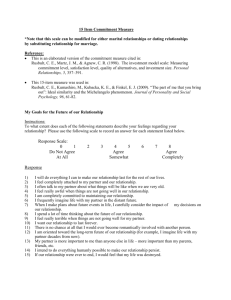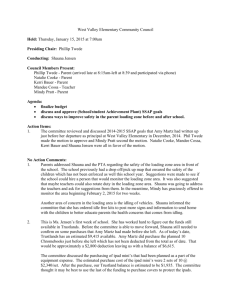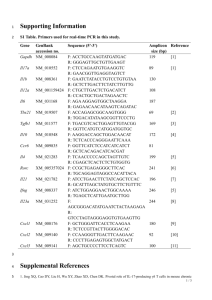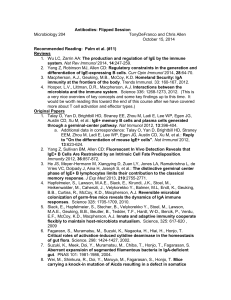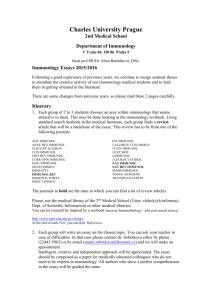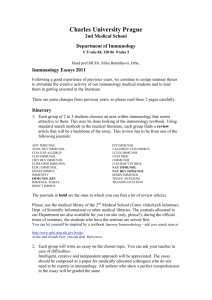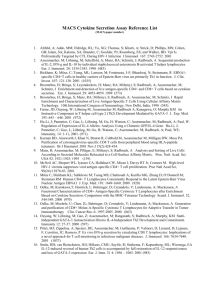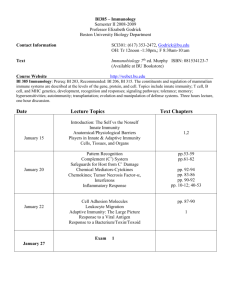All Publications
advertisement
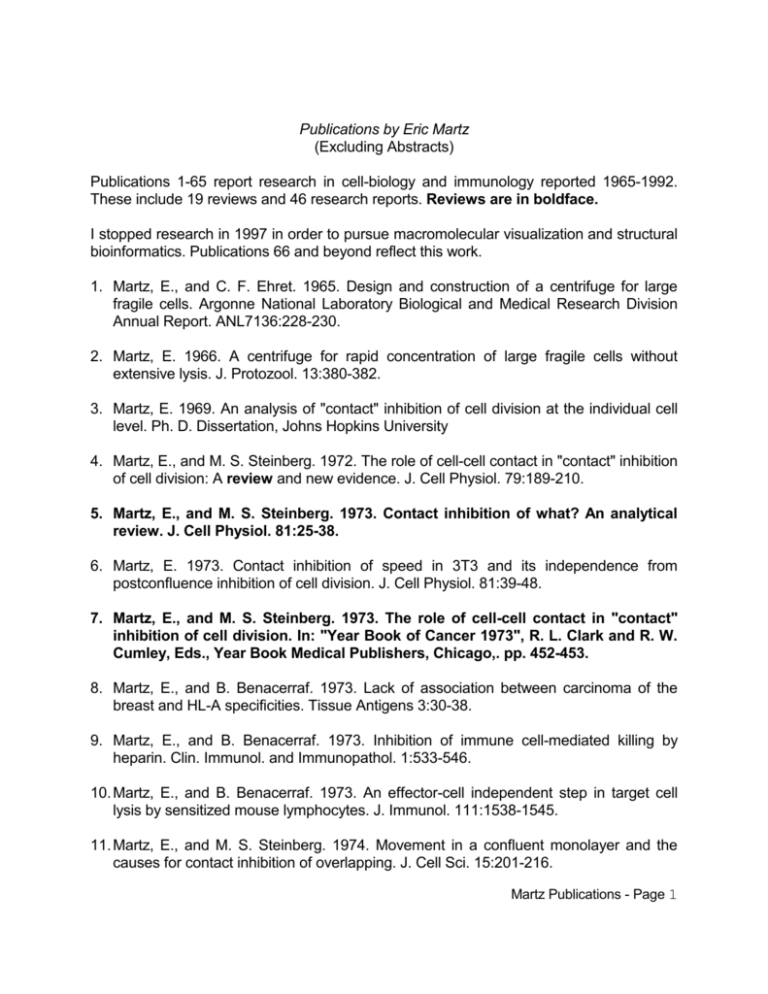
Publications by Eric Martz
(Excluding Abstracts)
Publications 1-65 report research in cell-biology and immunology reported 1965-1992.
These include 19 reviews and 46 research reports. Reviews are in boldface.
I stopped research in 1997 in order to pursue macromolecular visualization and structural
bioinformatics. Publications 66 and beyond reflect this work.
1. Martz, E., and C. F. Ehret. 1965. Design and construction of a centrifuge for large
fragile cells. Argonne National Laboratory Biological and Medical Research Division
Annual Report. ANL7136:228-230.
2. Martz, E. 1966. A centrifuge for rapid concentration of large fragile cells without
extensive lysis. J. Protozool. 13:380-382.
3. Martz, E. 1969. An analysis of "contact" inhibition of cell division at the individual cell
level. Ph. D. Dissertation, Johns Hopkins University
4. Martz, E., and M. S. Steinberg. 1972. The role of cell-cell contact in "contact" inhibition
of cell division: A review and new evidence. J. Cell Physiol. 79:189-210.
5. Martz, E., and M. S. Steinberg. 1973. Contact inhibition of what? An analytical
review. J. Cell Physiol. 81:25-38.
6. Martz, E. 1973. Contact inhibition of speed in 3T3 and its independence from
postconfluence inhibition of cell division. J. Cell Physiol. 81:39-48.
7. Martz, E., and M. S. Steinberg. 1973. The role of cell-cell contact in "contact"
inhibition of cell division. In: "Year Book of Cancer 1973", R. L. Clark and R. W.
Cumley, Eds., Year Book Medical Publishers, Chicago,. pp. 452-453.
8. Martz, E., and B. Benacerraf. 1973. Lack of association between carcinoma of the
breast and HL-A specificities. Tissue Antigens 3:30-38.
9. Martz, E., and B. Benacerraf. 1973. Inhibition of immune cell-mediated killing by
heparin. Clin. Immunol. and Immunopathol. 1:533-546.
10. Martz, E., and B. Benacerraf. 1973. An effector-cell independent step in target cell
lysis by sensitized mouse lymphocytes. J. Immunol. 111:1538-1545.
11. Martz, E., and M. S. Steinberg. 1974. Movement in a confluent monolayer and the
causes for contact inhibition of overlapping. J. Cell Sci. 15:201-216.
Martz Publications - Page 1
12. Martz, E., H. M. Phillips, and M. S. Steinberg. 1974. Contact inhibition of overlapping
and differential cell adhesion: A sufficient model for the control of certain cell culture
morphologies. J. Cell Sci. 16:401-419.
13. Martz, E., and B. Benacerraf. 1974. Crucial events in target-cell lysis by sensitized
mouse T-lymphocytes: A killer-cell independent, temperature sensitive step. Adv.
Biosci. 12:37-46.
14. Martz, E., S. J. Burakoff, and B. Benacerraf. 1974. Interruption of the sequential
release of small and large molecules from tumor cells by low temperature during
cytolysis mediated by immune T-cells or complement. Proc. Nat. Acad. Sci. U. S.
71:177-181.
15. Burakoff, S. J., E. Martz, and B. Benacerraf. 1975. Is the primary complement lesion
insufficient for lysis? Failure of cells damaged under osmotic protection to lyse in
EDTA or at low temperature after removal of osmotic protection. Clin. Immunol. and
Immunopathol. 4:108-126.
16. Martz, E. 1975. Early steps in specific tumor cell lysis by sensitized mouse Tlymphocytes I. Resolution and characterization. J. Immunol. 115:261-267.
17. Martz, E., and B. Benacerraf. 1975. T-lymphocyte mediated cytolysis: Temperature
dependence of killer cell dependent and independent phases and lack of recovery
from the lethal hit at low temperatures. Cellular Immunol. 20:81-91.
18. Martz, E. 1975. Inability of EDTA to prevent damage mediated by cytolytic Tlymphocytes. Cellular Immunol. 20:304-314.
19. Martz, E. 1976. Early steps in specific tumor cell lysis by sensitized mouse T
lymphocytes II. Electrolyte permeability increase in the target cell membrane
concomitant with programming for lysis. J. Immunol. 117:1023-1027.
20. Martz, E., and B. Benacerraf. 1976. Multiple target cell killing by the cytolytic Tlymphocyte and the mechanism of cytotoxicity. Transplantation. 21:5-11.
21. Martz, E. 1976. Sizes of isotopically-labelled molecules released during lysis of tumor
cells labelled with {u51{Cr and {u14{C-nicotinamide. Cellular Immunol. 26:313-321.
22. Martz, E. 1977. Mechanism of specific tumor cell lysis by alloimmune T
lymphocytes: Resolution and characterization of discrete steps in the cellular
interaction. Contemp. Topics Immunobiol. 7:301-361.
Martz Publications - Page 2
23. Gately, M. K., and E. Martz. 1977. Comparative studies on the mechanisms of
nonspecific, Con A-dependent cytolysis and specific T cell-mediated cytolysis. J.
Immunol. 119:1711-1722.
24. Timpe, L., E. Martz, and M. S. Steinberg. 1978. Cell movements in a confluent
monolayer are not caused by gaps. Evidence for direct contact inhibition of
overlapping. J. Cell Sci. 30:293-304.
25. Tsoukas, C. D., and E. Martz. 1978. Simultaneous suppression of allogeneic cytolytic
activity and stimulation of lectin-dependent cytolytic activity by con A. Cellular
Immunol. 40:103-116.
26. Gately, M. K., and E. Martz. 1979. Early steps in specific tumor cell lysis by sensitized
mouse T lymphocytes III. Resolution of two distinct roles for calcium in the cytolytic
process. J. Immunol. 122:482-489.
27. Butterworth, A. E., M. A. Vadas, E. Martz, and A. Sher. 1979. Cytolytic T lymphocytes
recognize alloantigens on schistosomula of }u+}Schistosoma}u-} }u+}mansoni}u-}, but
fail to induce damage. J. Immunol. 122:1314-1321.
28. Martz, E. 1980. Immune lymphocyte to tumor cell adhesion: magnesium sufficient,
calcium insufficient. J. Cell Biol. 84:584-598.
29. Parker, W. L., and E. Martz. 1980. Lectin-induced nonlethal adhesions between
cytolytic T lymphocytes and antigenically unrecognizable tumor cells, and nonspecific
"triggering" of cytolysis. J. Immunol. 124:25-35.
30. Gately, M. K., W. J. Wechter, and E. Martz. 1980. Early steps in specific tumor cell
lysis by sensitized mouse T lymphocytes IV. Inhibition of programming for lysis by
pharmacologic agents. J. Immunol. 125:783-92.
31. Gately, M. K., and E. Martz. 1981. Early steps in specific tumor cell lysis by sensitized
mouse T lymphocytes V. Evidence that manganese inhibits a calcium-dependent step
in programming for lysis. Cellular Immunol. 61:78-89.
32. Gately, M. K., and E. Martz. 1981. T11: A new protein marker on activated murine T
lymphocytes. J. Immunol. 126:709-714.
33. Davignon, D., E. Martz, T. Reynolds, K. Kürzinger, and T. A. Springer. 1981.
Lymphocyte function-associated antigen one (LFA-1): a surface antigen distinct from
Lyt-2/3 that participates in T lymphocyte-mediated killing. Proc. Nat. Acad. Sci. U. S.
78:4535-4539.
Martz Publications - Page 3
34. Davignon, D., E. Martz, T. Reynolds, K. Kürzinger, and T. A. Springer. 1981.
Monoclonal antibody to a novel lymphocyte function-associated antigen (LFA-1).
Mechanism of blockade of T lymphocyte-mediated killing and effects on other T and B
lymphocyte functions. J. Immunol. 127:590-595.
35. Kürzinger, K., T. Reynolds, R. N. Germain, D. Davignon, E. Martz, and T. A. Springer.
1981. A novel lymphocyte function-associated antigen (LFA-1): cellular distribution,
quantitative expression, and structure. J. Immunol. 127:596-602.
36. Springer, T. A., K. Kürzinger, T. Reynolds, R. N. Germain, D. Davignon, and E.
Martz. 1981. Monoclonal antibodies as probes of surface structures
participating in T lymphocyte function. In: "Monoclonal Antibodies and T Cell
Hybridomas," U. Hämmerling, G. Hämmerling, and J. Kearney, Eds, Elsevier, pp.
45-52.
37. Parker, W. L., and E. Martz. 1982. Calcium ionophore A23187 as a secretagogue for
rat mast cells: Does it bypass inhibition by calcium flux blockers? Agents & Actions
12:276-284.
38. Martz, E., W. L. Parker, M. K. Gately and C. D. Tsoukas. 1982. The role of calcium
in the lethal hit of T lymphocyte-mediated cytolysis. Adv. Exp. Biol. Med.
146:121-143.
39. Martz, E., D. Davignon, K. Kürzinger, and T. A. Springer. 1982. The molecular
basis for cytolytic T lymphocyte function: analysis with blocking monoclonal
antibodies. Adv. Exp. Biol. Med. 146:447-465.
40. Springer, T. A., D. Davignon, M.-K. Ho, K. Kürzinger, E. Martz, and F. SanchezMadrid. 1982. LFA-1 and Lyt-2,3 molecules associated with T lymphocytemediated killing; and Mac-1, an LFA-1 homolog associated with complement
receptor function. Immunol. Rev. 68:171-195.
41. Sanchez-Madrid, F., D. Davignon, E. Martz, and T. A. Springer. 1982. Functional
screening for antigens associated with mouse T lymphocyte-mediated killing yields
antibodies to Lyt-2,3 and LFA-1. Cellular Immunol. 73:1-11.
42. Gromkowski, S. H., W. Heagy, F. Sanchez-Madrid, T. A. Springer, and E. Martz.
1983. Blocking of CTL-mediated killing by monoclonal antibodies to LFA-1 and Lyt-2,3
I. Increased susceptibility to blocking after papain treatment of target cells. J. Immunol.
130:2546-2551.
43. Martz, E., W. Heagy, and S. H. Gromkowski. 1983. The mechanism of CTLmediated killing: monoclonal antibody analysis of the roles of killer and target
Martz Publications - Page 4
cell membrane proteins. Immunol. Rev. 72:73-96.
44. Martz, E. 1983. One man's answer to immunological information overload:
microcomputer management of the personal reprint collection. Immunology Today,
4:271-273.
45. Heagy, W., C. Waltenbaugh, and E. Martz. 1984. Potent ability of anti-LFA-1
monoclonal antibody to prolong allograft survival. Transplantation 37:520-523.
46. Martz, E. 1984. Killer cell mechanisms: lytic granules, adhesion molecules, and
other recent insights.
Immunol. Today 5:254-255. (Review of the 2nd
International Workshop on Mechanisms of Cell-Mediated Killing.)
47. Gromkowski, S. G., W. Heagy, and E. Martz. 1985. Blocking of CTL- mediated killing
by monoclonal antibodies to LFA-1 and Lyt-2,3 II. Evidence that trypsin pretreatment
of target cells removes a non-H-2 molecule important in killing. J. Immunol.
134:70-77.
48. Gromkowski, S. G., A. M. Krensky, E. Martz, and S. J. Burakoff. 1985. Functional
distinctions between the LFA-1, LFA-2, and LFA-3 membrane proteins on human CTL
are revealed with trypsin-pretreated target cells. J. Immunol. 134:244-249.
49. Mentzer, S. J., S. H. Gromkowski, A. M. Krensky, S. J. Burakoff, and E. Martz. 1985.
LFA-1 membrane molecule in the regulation of homotypic adhesions of human B
lymphocytes. J. Immunol. 135:9-11.
50. Martz, E. 1985. Lymphocyte function-associated antigens: regulation of
lymphocyte adhesions in vitro and immunity in vivo. Adv. Exp. Med. Biol.
184:291-307.
51. Henkart, P., and E. Martz, Eds. 1985. Mechanisms of Cell-Mediated Cytotoxicity
II, Plenum Press, N. Y., 568 pages. (Proceedings of the 2nd International
Workshop on Mechanisms of Cell-Mediated Cytotoxicity; Adv. Exp. Med. Biol.
Volume 184.)
52. Martz, E. 1987. LFA-1 and other accessory molecules functioning in adhesions
of T and B lymphocytes. Human Immunol. 18:3-37.
53. Howell, D. M. and E. Martz. 1987. The degree of CTL-induced DNA solubilization is
not determined by the human vs. mouse origin of the target cell. J. Immunol.
138:3695-3698.
54. Howell, D. M. and E. Martz. 1987. Intracellular reovirus survives CTL-mediated lysis
Martz Publications - Page 5
of its host cell. J. Gen. Virol., 68:2899-2907.
55. Howell, D. M., and Martz E. 1988. Evidence against damage to the nuclear envelope
of the target cell in the induction of nuclear disintegration by cytolytic T lymphocytes. J.
Immunol. 140:689-692
56. Howell, D. M., and Martz E. 1988. Low calcium concentrations support killing by some
but not all cytolytic T lymphocytes, and reveal inhibition of a postconjugation step by
calcium antagonists. J. Immunol. 140:1982-1988
57. Martz, E., and Howell, D. M. 1989. CTL: virus control cells first and cytolytic cells
second? DNA fragmentation, apoptosis, and the prelytic halt hypothesis.
Immunol. Today 10:79-86
58. Martz, E. 1992. Leukocyte Function-Associated Antigen One (LFA-1). In:
"Encyclopedia of Immunology", Roitt, I. M. and Delves, P. J., eds., Academic
Press, London. pp. 998-1001.
59. O'Rourke, A. M., J. R. Apgar, K. P. Kane, E. Martz, and M. F. Mescher. 1991.
Cytoskeletal function is required for CD8- and T cell receptor-mediated interaction of
cytotoxic T lymphocytes with class I protein. J. Exp. Med. 173:241-249.
60. Martz, E. and S. R. Gamble. 1992. How do CTL control virus infections? Evidence for
prelytic halt of Herpes simplex. Viral Immunology 5:81-91.
61. Martz, E. 1993. Overview of CTL-target adhesion and other critical events in the
cytotoxic mechanism. In: "Cytotoxic cells: recognition, effector function,
generation, and methods", Sitkovsky, M. V.; Henkart, P. A., eds., Birkhäuser;
Boston MA USA, pp. 9-45.
62. Martz, E. 1993. The 51Cr-release assay for CTL-mediated target cell lysis. In:
"Cytotoxic cells: recognition, effector function, generation, and methods",
Sitkovsky, M. V.; Henkart, P. A., eds., Birkhäuser; Boston MA USA, pp. 457-67.
63. Martz, E. 1993. Can CTL control virus infections without cytolysis? The prelytic
halt hypothesis. In: "Cytotoxic cells: recognition, effector function, generation,
and methods", Sitkovsky, M. V.; Henkart, P. A., eds., Birkhäuser; Boston MA
USA, pp. 366-9.
64. Martz, E. 1993. DNA fragmentation and cytolysis assayed by 3H-thymidine. In:
"Cytotoxic cells: recognition, effector function, generation, and methods",
Sitkovsky, M. V.; Henkart, P. A., eds., Birkhäuser; Boston MA USA, pp. 468-71.
Martz Publications - Page 6
65. Martz, E. 1997. Leukocyte function-associated antigen one (LFA-1). In
"Encyclopedia of immunology", Second Edition, Roitt, I. M.; Delves P. J., eds.
Academic Press, London UK.
66. Martz, Eric. 2002. Protein Explorer: Easy Yet Powerful Macromolecular Visualization,
Trends in Biochemical Sciences, 27:107-109.
67. Martz, Eric, 2003. "3D Molecular Visualization with Protein Explorer" in "Introduction
to Bioinformatics", Stephen A. Krawetz and David D. Womble, eds, Humana Press,
Totowa NJ, Chapter 32, pages 565-586.
68. Glaser, Fabian, Tal Pupko, Inbal Paz, Rachel E. Bell, Eric Martz, and Nir Ben-Tal.
2003. ConSurf: Identification of Functional Regions in Proteins by Surface-Mapping of
Phylogenetic Information. Bioinformatics 19:163-4.
69. Duncan, Gary A., Eric Martz, and Sam Donovan, 2003. "Proteins: historians of life on
earth", in "Microbes count! Problem posing, problem solving, and peer persuasion in
microbiology", John R. Jungck, Marion Field Fass, and Ethel D. Stanley, eds.
BioQUEST Curriculum Consortium, pp. 181-190.
70. Martz, Eric, and Timothy Driscoll, 2004. "Introduction to Macromolecular
Visualization", in "The Internet for Molecular Biologists: A Practical Approach", Clare
Sansom and Robert Horton, eds., Oxford University Press, in press.
71. Martz, Eric, 2004, "Visualization, Molecular" plus eleven related entries for the
Dictionary of Bioinformatics, John M. Hancock and Marketa J. Zvelebil, eds., John
Wiley Publishers, in press.
Martz Publications - Page 7
